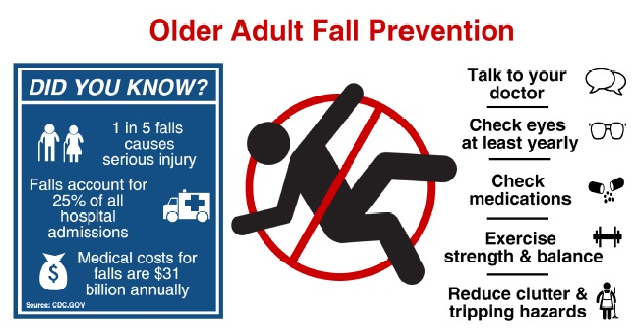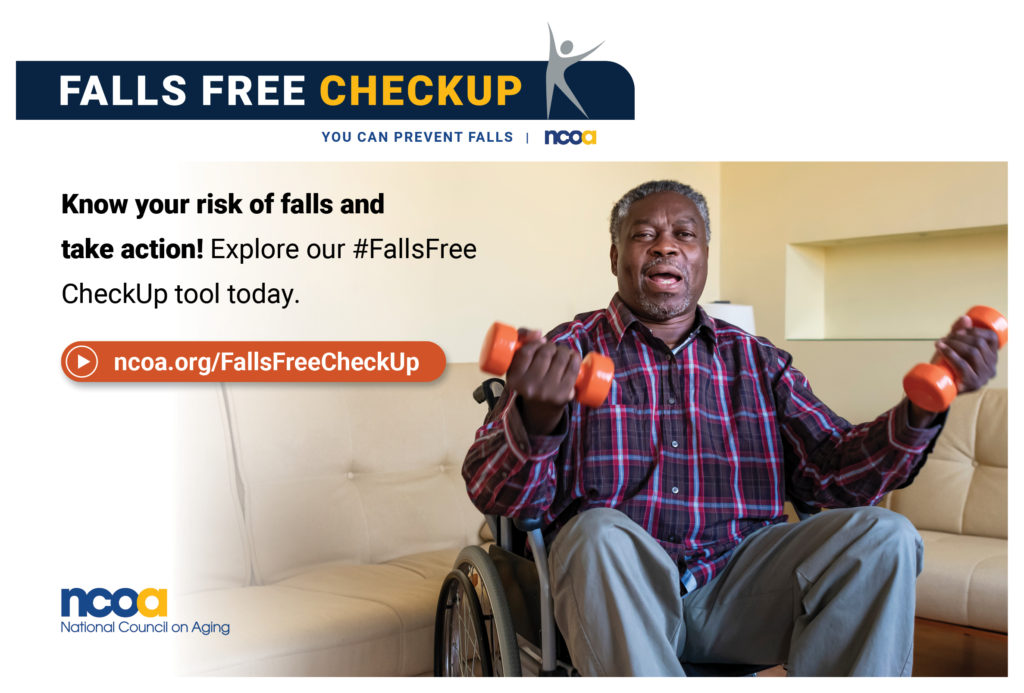
My late husband was a role model for using common tools to prevent falls so that we could focus on enjoying life rather than fear of falling and recovery from injury. Many people seem to think falling is a normal part of aging, it’s not. Most falls can be prevented. We each have it within our power to reduce risk and move on.
September 21-25 is Falls Prevention Awareness Week. Did you know that 25% of older Americans fall every year – and that falls are the leading cause of both fatal and nonfatal injuries for people over the age of 65?
A few common myths about falling are worth thinking about. For example, a common misnomer is thinking that if you limit activity, you won’t fall. Ironically, this attitude actually increases risk of falling.
Key to preventing falls is increasing one’s strength, flexibility and balance. Increasing strength, flexibility and balance requires regular physical activity. Formal classes like tai chi or gentle yoga are terrific, so is any regular exercise and stretching routine to maintain range of motion. It’s a myth that muscle strength and flexibility can’t be regained; it’s never too late to make a difference. Social activities are great, get moving!
Another false notion is that if you stay home, you’re safer. Wrong – over half of all falls occur at home. What’s important is taking a critical eye as to how the home is organized. A serious look at lighting, stairs, floors and bathrooms can reap huge rewards.
For example, we all need more light to see well as we age. Use bright bulbs and put in night lights at multiple locations. Night lights that cast a small light rather than glow provide more safety, but either will help. Battery operated lights can help in areas without electricity. Put light switches at the top and bottom of stairways.
Floors need to be clutter free, rugs removed where possible, taped down where not, and cords or wires coiled out of the way. Make sure carpet on stairs is firmly attached or remove it to add non-slip treads. Repair loose or uneven steps and think about having handrails on both sides if possible.
Handrails should be added on steps inside and outside the home wherever feasible, even little one or two step passages. Don’t forget steps into the garage. In the bathroom, handrails shift to grab bars. All tubs and showers should have grab bars, and replacing strategic towel bars with grab bars makes sense in many cases. Use rubber mats or self-stick strips in the tub or shower.

These alterations can be tastefully done, blend in well and serve all ages. Well-equipped homes actually increase in value and marketability. Other fall prevention steps include getting a medical eye exam and asking your doctor or pharmacist about possible drug effects on balance.
Don’t be in denial with yourself or a loved one. The Centers for Disease Control [CDC] recommends asking yourself or someone you care about the following 3 questions. Have you fallen in the past year? Do you feel unsteady when standing or walking? Do you worry about falling? If the answer to any of them is “yes”, talk to your doctor about it. Maybe they can help.
If it’s not correctable, don’t view using a walker or cane as making you more dependent. On the contrary, it’ll likely make you more mobile. My husband taught me that. He readily accepted a cane to steady balance and keep going. When distances became hard, he shifted to lightweight portable scooters. Enjoying the outdoors together for decades, our last hike was him on a scooter, me alongside, enjoying the many paved trails in Zion and Bryce National Parks. Thanks honey.
-Lynn Kellogg
For more information on falls prevention please read and save the handouts below.
